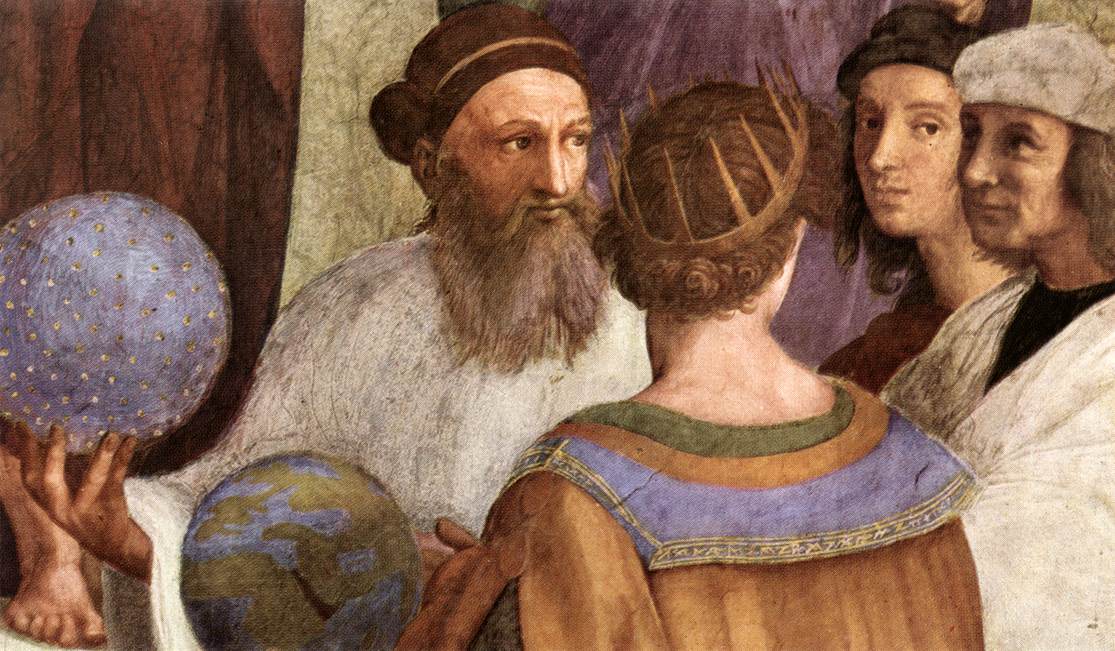 |
| The School of Athens [featuring Zoroaster] by Raphael, 1590. Public domain via Wikimedia. |
 Ecce Homo by Friedrich Nietzsche
Ecce Homo by Friedrich NietzscheMy rating: 4 of 5 stars
Nietzsche's autobiography is bewildering. The title, Ecce Homo, means "Behold the Man" in Latin, and is ascribed to Pontius Pilate when he presented Jesus to the mob. The title is clever in that Nietzsche, in concluding, is "Dionysus versus Christ" (p. 143). But this seems to me to be misleading when the subtitle (which is absent from this Dover version), reads "How One Becomes What One Is". Without the subtitle, one might justify an off-handed rejection of Ecce Homo as little more than vanity given too much regard by posterity. Indeed, I wonder had Nietzsche written this today, would he have ever been known? At times I felt that Nietzsche was of a privileged class and was able to publish at will, but this is not entirely the case. Nietzsche's father, a Lutheran pastor, had worked for the state and, following his premature death, this qualified Nietzsche for a scholarship. Hardly peak bourgeoisie, yet Nietzsche was a polymath; surely symptomatic of genius. If the subtitle is considered during the reading, then "how Nietzsche became Nietzsche" is less troubling to the modern mind. At the same time, Nietzsche goes out of his way to tell us that the effeminate, decaying, degenerative way perpetuated by Christianity is a denial of nature, of the body, of the present - so why would he be all meek and modest? Hence my bewilderment. Believe "neither in 'ill-luck' nor 'guilt'" - this is the opposite of a decadent (it is Nietzsche) (p. 13). "Unselfishness" and "neighbourly love" are conditions of the decadent, these are signs of weakness; pity is not a virtue (p. 18). Nietzsche tells us how he has never felt bad about himself, no guilt, no self-flagellation. The basic argument is that Christianity has poisoned us against ourselves - not faith, not God per se, but the religion of Christianity. Undoing this decadence is therefore essential. But atheists find no solace, either: Socrates is no role model. Nietzsche hints at Heraclitus as one of the few who understood (at least through the Stoics) (p. 73). This is interesting in that Heraclitus had a particular view of God and the gods that one steeped in the atheistic view of Nietzsche will struggle to comprehend. The most important words from Ecce Homo outline Nietzsche's philosophy for living: amor fati (p. 54):
My formula for greatness in man is amor fati: the fact that a man wishes nothing to be different, either in front of him or behind him, or for all eternity. Not only must the necessary be borne, and on no account concealed,- all idealism is falsehood in the face of necessity,- but it must also be loved...
Nietzsche writes disapprovingly of equal rights, particularly for women (p. 65), yet, at the same time, in addition to his view of the "opiate of the masses", betrays a Marxian loathing for the decadence of the "false economy" of "the division of labour" (p. 76). He goes on to address the problem of our current times: the "large number of young men... all in... [a] state of distress" because of the false "calling" to vocations that are unnatural and lead to a "feeling of emptiness and hunger" (p. 87). With so much going on, it is unlikely that a reading of Nietzsche's work in its entirety is enough to comprehend his insights from the rabbit hole of the human soul. But if I have taken away just one thing from Ecce Homo, it is a deeper understanding of the concept of amor fati. Its opposite can be seen in those who reject the body (interesting that Nietzsche says he can "smell" the decadents), where the golden arrow of consumption masks much of the truth (that many could not face if it were revealed, but can happily consume while it is well-masked), and I take it that Nietzsche meant both the corporeal and spiritual aspects of the analogy. But I will let Nietzsche have the last word:
...that which is necessary does not offend me. Amor fati is the core of my nature.
View all my reviews
 Donate
Donate
.jpg)




